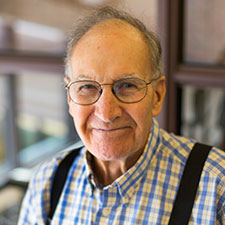非常抱歉,
你要访问的页面不存在,
非常抱歉,
你要访问的页面不存在,
非常抱歉,
你要访问的页面不存在,
验证码:

职称:Dale E. Briggs Professor
所属学校:University of Michigan-Ann Arbor
所属院系:Chemical Engineering
所属专业:Chemical Engineering
联系方式:(734) 764-2383
Dale Briggs arrived for this interview about two minutes late. He was a little delayed getting out of the Washtenaw County Jail. No, he wasn't incarcerated-he was teaching his weekly religion class for alcoholic inmates. It's just one of the activities that make him a non-stereotypical chemical engineer. He still operates the small flower business that he started prior to his retirement in 1999, donating flowers to the College of Engineering, School of Music, and his church. Always active in his church, Dale served for many years as a lay chaplain at the Veteran's Administration Hospital in Ann Arbor. But perhaps the most unusual accomplishment for this retired engineer is that he has served on over 49 doctoral committees in the School of Music. A highly respected "amateur classical music historian," he is highly sought after to critique "listenability" and stage performance of some of the finest artists in the Midwest. Dale began taking viola lessons shortly after retirement but admits that his performances aren't quite up to the standards of those he critiques. Raised in Pontiac, MI, Dale received his bachelor's degree in chemical engineering from the University of Louisville in 1953 and enrolled at the University of Michigan in 1957 after four years of active duty in the Navy. While completing his graduate work in the department, he also began his teaching career here. Over the span of his thirty-eight-year career, Professor Briggs taught almost every subject in the curriculum except kinetics and process control. However, he had a special affinity for teaching design, using his expertise from consulting for industries ranging from petrochemicals to a distillery. "Other faculty really didn't want to teach design," Dale says, "but I found it challenging to put together a system based on calculations and to have the confidence that it would work." As many of you remember, Dale also served as undergraduate program advisor and was instrumental in broadening the curriculum to permit chemical engineering to become a popular stepping-stone to medical school and other professional degrees. "I feel an engineering degree opens the door to about anything you want to do," Dale says. "It gives you a sense of confidence that you can meet almost any challenge." In his research, Dale worked closely with Edwin Young and Donald Katz. His initial work was in heat transfer, but later research activities shifted to a topic that has attracted renewed interest today: How to get clean energy from coal. If you run into Professor Briggs on the street and say, " How are you?" he will almost always reply, "Better." And if you ask him why he's better, he will explain that "The good Lord asks that we try to make ourselves and the world a little better every day." and adds, "I like to think I'm making a little progress." Those of us who know Dale Briggs will attest that he is indeed! Article from the 2008 Chemical Engineering Newsletter.
Dale Briggs arrived for this interview about two minutes late. He was a little delayed getting out of the Washtenaw County Jail. No, he wasn't incarcerated-he was teaching his weekly religion class for alcoholic inmates. It's just one of the activities that make him a non-stereotypical chemical engineer. He still operates the small flower business that he started prior to his retirement in 1999, donating flowers to the College of Engineering, School of Music, and his church. Always active in his church, Dale served for many years as a lay chaplain at the Veteran's Administration Hospital in Ann Arbor. But perhaps the most unusual accomplishment for this retired engineer is that he has served on over 49 doctoral committees in the School of Music. A highly respected "amateur classical music historian," he is highly sought after to critique "listenability" and stage performance of some of the finest artists in the Midwest. Dale began taking viola lessons shortly after retirement but admits that his performances aren't quite up to the standards of those he critiques. Raised in Pontiac, MI, Dale received his bachelor's degree in chemical engineering from the University of Louisville in 1953 and enrolled at the University of Michigan in 1957 after four years of active duty in the Navy. While completing his graduate work in the department, he also began his teaching career here. Over the span of his thirty-eight-year career, Professor Briggs taught almost every subject in the curriculum except kinetics and process control. However, he had a special affinity for teaching design, using his expertise from consulting for industries ranging from petrochemicals to a distillery. "Other faculty really didn't want to teach design," Dale says, "but I found it challenging to put together a system based on calculations and to have the confidence that it would work." As many of you remember, Dale also served as undergraduate program advisor and was instrumental in broadening the curriculum to permit chemical engineering to become a popular stepping-stone to medical school and other professional degrees. "I feel an engineering degree opens the door to about anything you want to do," Dale says. "It gives you a sense of confidence that you can meet almost any challenge." In his research, Dale worked closely with Edwin Young and Donald Katz. His initial work was in heat transfer, but later research activities shifted to a topic that has attracted renewed interest today: How to get clean energy from coal. If you run into Professor Briggs on the street and say, " How are you?" he will almost always reply, "Better." And if you ask him why he's better, he will explain that "The good Lord asks that we try to make ourselves and the world a little better every day." and adds, "I like to think I'm making a little progress." Those of us who know Dale Briggs will attest that he is indeed! Article from the 2008 Chemical Engineering Newsletter.